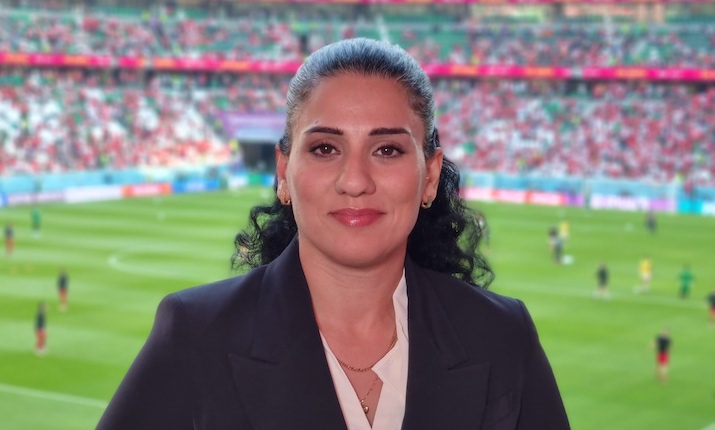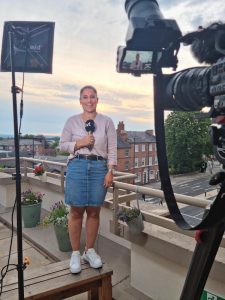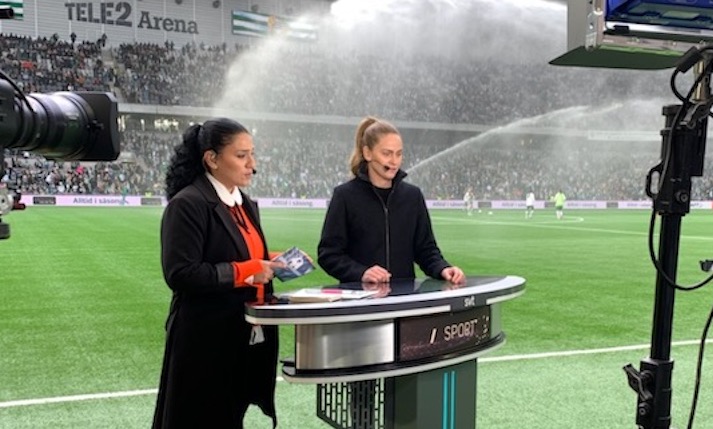Dare to dream: How SVT Sport’s Rihaneh Rouhani became a face of football

Rouhani reporting during the FIFA Men’s World Cup in Qatar 2022 – from the presenter position at an arena
“Being part of live sport is something that I have always been drawn to,” says SVT Sport reporter (programledare in Swedish) Rihaneh Rouhani. “Being near the pitch or inside or outside the stadium I can bring the audience closer to that live feeling, bringing some of that experience to those as interested in the sports as I am.
“But I never thought that I would get the opportunity to work with TV broadcasting, even less with the one thing I love the most – sports,” she adds, “I thought you had to have the connections almost from birth to even have the chance to work in TV.”
Sporting vision
A 12-year-old Rouhani watching one of Sweden’s most famous sports presenters at the time once pointed to the TV screen and told her mum, “one day I want to be just like her”.
“The presenter had brown hair and got to work with sports, which made me dream,” she says today. “But as time passed, I obviously forgot about that dream. Sport has always been an important part of my life, but never did I think that one day I would work with sports first-hand, the way I do right now.”
Some dreams have a way of sticking with you though. After choosing to study law at university and deciding she would rather follow a path towards media law, she dropped out and started on a media course at Stockholm University.
“I thought maybe if I studied media I can get into law afterwards, but on the media course, everything I wrote and all the assignments I did were sports-oriented,” she recalls. “At the end of my media studies I did my internship at the TV show Efterlyst [an equivalent of America’s Most Wanted] and for the first time got a glimpse of what a TV production would look like.”
After taking on a producer role at the same company, Rouhani started to work in Swedish media law at the Swedish Press and Broadcasting Authority.
“My dream of working with media and law came true. I loved it and gained so much knowledge about the kind of laws Swedish TV and radio must deal with; I still find a use for that knowledge in my work today. My area of expertise was around patronage, and how brands are exposed within broadcasting. As part of this, I examined how athletes are presented in sports broadcasting, which brands were covering their clothing and so on. This made me see the world of sports broadcasting in a way that I had never done before. I got to think of how a sports broadcasting production is made but only by analysing what the audience sees.”
After almost three years working in law, Rouhani felt she needed to spread her wings in the area that she’d studied. “I moved over 600km north in Sweden to a city called Umeå and started working as a morning show host for a local Sveriges Radio station,” she recalls. “After two years up north, I moved back for youth radio work in Stockholm. Soon afterwards I started working at Radiosporten [Sveriges Radio’s sports department] for five months. It was then that the sports director for SVT Sport called and shortly after a meeting, I started working at SVT Sport as a sports reporter on the website and for broadcast.”
Almost immediately she tried out as a TV presenter and got promoted. She recalls the moment: “When I first got the job at SVT in 2015 and did my first show as a sports news presenter my mum said to me, ‘isn’t this ironic, before you even were planning on studying law, this is what you wanted to do’.”
Moving on up
Rouhani has since spent time at TV4 as a sports broadcaster, and also at Expressen, one of Sweden’s biggest newspapers. Since returning to SVT Sport in 2018 she’s had different roles but has been a reporter and broadcasting presenter first and foremost. In 2020 she moved into a job with more of a football focus, a major interest for Rouhani.
“I believed that if you are going to be competing in sports journalism and in particular in sports broadcasting you have to face the fact that you probably won’t be working with the specific sport you are interested in, so I decided to be interested in all of them,” she says. “To keep the job as a dedicated football reporter you need to be at the top of your game. As a presenter, you need to make the game and the news regardless of the sports, accessible to all viewers. It’s not easy, but it’s a must.”

Reporting from Sheffield, England, during the UEFA Women’s Euro 2022 – from the hotel terrace to get a view of the city
Over the past two years, Rouhani has progressed as both a reporter in the field but also as a presenter inside and outside the studio. “I have also had the chance to work with big football tournaments like the FIFA World Cup, the European Championships and the Champions League,” she says. “The most fulfilling thing I have done so far is the last World Cup, in Qatar. There was so much criticism about the host country, and we all arrived there with a lot of prejudice. As a person born in Iran, they were the same stereotypes I have heard all of my life. Saying that, I also fell for the prejudice and took it all with me to Qatar.
“However, when there it took me about three days to wash it all away and act as I know I can. Although the tournament became ‘about’ the revolution in Iran for the first couple of days, I felt like my company did a really good job of talking both about sports and politics around the World Cup in Qatar and the rest of the world. I felt like I did the absolute best I could in the tournament and so did my company.
“Presenting at these big games and arenas has made me much more secure,” she continues. “I feel it isn’t as big of a challenge when coming to an international arena. I have also embraced having a specific area of expertise and although I know I can contribute to other sports, I feel content with being a football reporter.”
Woman’s world
As a woman and as an immigrant, Rouhani is still encountering prejudice. “I’m not sure if you ever really get past the challenges, they keep coming,” she says. “I think the biggest challenge for me has been that people have told me I don’t deserve to be where I am in my career, that all my efforts are not seen. I’ve been told that I’ve only got to where I am because of the colour of my hair or skin. These days I laugh about it more, but early on in my career, I felt like I had to prove them wrong and work harder. It made it really tough to ever feel like anything I did was good enough. As a woman, there is always the question of whether I ‘even like sports’. You’d think that in 2023 this is not something we hear, but it is. All of my female colleagues have heard this, and it is sad. But these days I know my value more. I try to talk to young girls and guys that I feel go through the same kind of comments and try to help them the best I can.”
“I’ve been told that I’ve only got to where I am because of the colour of my hair or skin. These days I laugh about it more, but early on in my career, I felt like I had to prove them wrong and work harder”
As for other women looking to move into a role in sports broadcasting, she tells them they need to trust themselves. “You can always ask for help but know where you stand before you do. In the end, you need to be able to vocalise what it is you want.
“I want to be very positive, but not all of it will be, and that is something I’ve learned the hard way; not everybody wants you to do well,” she adds. “You must have a fighting spirit, don’t give up on anything that you want. Like sports, sports journalism is very competitive, and you should be too, but that does not mean that you can’t be nice. Always be nice and treat your colleagues the way you and others deserve to be treated. I don’t believe in stomping on others to get to the top.
“But the truth is, nothing comes for free for us women, even if some people seem to think that we are filling quotas in sports journalism. But women have paved the way before us, and we will as well for the next generation.”
She feels that SVT Sport has made a lot of progress regarding gender and diversity in sports broadcasting. “I feel like we are seeking to be more of a broadcasting company for all of Sweden and not only the ethnic Swedes. Diversity – talking about racism but also about sports personalities in different areas of the country – has taken a bigger place in our news ratings. Although we always want it to be better, I think we are finding the right path, just like we have done with gender equality in our news.”

Presenting a Damallsvenskan derby game between two of the biggest clubs in Stockholm, with former national team player Lisa Dahlkvist
Then there are the challenges around access and football rights. “Being a rights holder, or not, has made [sports broadcasting] very difficult,” she says. “Our viewers have a lot of expectations of us as a public service channel. That makes it difficult to explain why we are not able to show certain goals or events.
“I also feel like anybody and everybody can call themselves a journalist nowadays, maybe by starting as an influencer,” she adds. “That makes our credibility questioned more and more. Credibility is important, especially for public service media. Also, an influencer does not [need to] live up to journalistic ethics.”
There are also challenges within the role itself. “These days with the athletes being bigger than ever and less available than ever, it’s harder to have a connection with them and still be able to be critical,” she reveals. “But that’s also what I love about the job; I will never stop holding athletes, directors, leaders, or fans accountable for their actions.”
Labour of love
“As a presenter and reporter, I like being the link between the athletes and the viewers, whether they are fans or not,” says Rouhani. “I like the fact that I can have an impact on young people’s interest in sports if I do my job properly. I can also make it accessible for people here in Sweden who don’t have Swedish as their first language, by not making the language too difficult and avoiding jargon.
“Sport is a feeling of togetherness, and I want to invite as many as possible to this gathering, regardless of how much or little you know about the game, the team or the tournament,” she continues. “I want to invite everybody to the sports family and feel that I can do it best when being so passionate about my job.”

